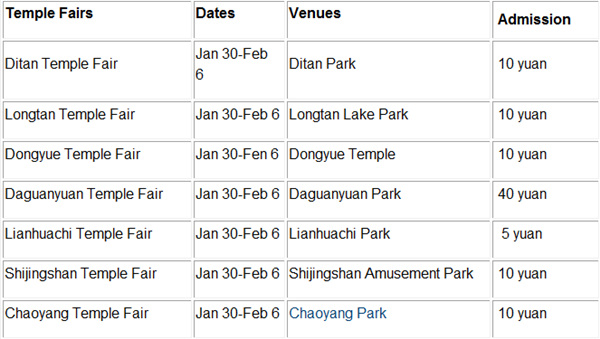

![Ditan temple fair.[Photo by Huang Xiaobing/Asianewsphoto] Ditan temple fair.[Photo by Huang Xiaobing/Asianewsphoto]](U429P886T1D99075F14DT20140128131530.jpg)
Ditan temple fair.[Photo by Huang Xiaobing/Asianewsphoto]
The tradition of a "temple fair" (Miao Hui) began as groups of vendors who did business near Buddhist and Taoist temples when many pilgrims came to pay tribute to the gods during traditional festivals. The practice grew, gradually turning into a regular event. Now temple fairs are an important and joyful destination for Chinese people during festivals, most especially the Spring Festival, or Chinese New Year.
Temple fairs in Beijing have a very long history, dating back to around 1000 AD, when they were called "Spring Outings," and saw a boom especially during the Ming and Qing dynasties (1368-1911) as well as the Republic of China (1912-1949). Major temples all have their own festivals, some of which are held regularly. During the Spring Festival, the temple fair is one of the most important activities, and a traditional cultural event that features all kinds of Chinese folk art. So far, there have been more than 10 major temple fairs held each year in Beijing.
In traditional temple fairs around Beijing, there are performances and booths demonstrating and selling traditional arts and crafts. The fairs have lots of games to play, food to eat, and performances to see, which attract lots of people. In the temple fairs you can taste numerous kinds of local snacks, court foods, and other dishes.
Most temple fairs feature dragon and lion dances, waist drum dancing, lotus blossom fairy dances, ground and clam dancing, as well as other folk performances, and some even stage traditional wedding ceremonies.
For foreigners, a temple fair is definitely a cultural experience, because it airs Chinese cultures from a very detailed perspective. While enjoying the samplings of Chinese delicacies, you can appreciate craftsmanship and artworks displayed by local artisans.
Nowadays, going to temple fairs has become a Spring Festival routine for residents in Beijing.
Ditan Temple Fair
Dates: Jan 30-Feb 6
Venue: Ditan Park, Dongcheng district
Admission: 10 yuan
One of the city's busiest temple fairs since 1985, Ditan (Temple of Earth) Park is the site of the altar where sacrifices were formerly offered to the earth god. This year's fair will climax with a performance reenactment of a Qing Dynasty sacrificial ceremony.
The Ditan Temple Fair will feature reenactments of traditional Ming and Qing ceremonies to worship the God of Earth. The park is the site of the altar where sacrifices were once made to the God of Earth.
This fair is one of Beijing's most popular and long standing. There will also be a range of folk performances, children's puppet shows and fashion shows, art exhibitions, ice lanterns and snow sculptures, and traditional Beijing snacks.
There will be a folk culture garden featuring song and dance of western China, as well as Red Storm Ditan Rock Concert. On the south side of the Sacrificial Altar, visitors can sing karaoke.
Other activities include a folk flower fair, an acrobatic show, Quyi performances, a fashion show, and a tea serving.
Longtan Temple Fair
Dates: Jan 30-Feb 6
Venue: Longtan Lake Park, Zuoanmennei Dajie, Chongwen district
Admission: 10 yuan
Fair events here are very similar to those in Ditan. There will be various interactive competitions inviting visitors to join in arm-wrestling, rock climbing, and chess playing.
Activities including an opera show, an acrobatics show, a Quyi performance, Judo, wrestling, a table tennis competition for middle-aged and senior people, a folk diabolo-spinning competition (a game in which a two-headed top is balanced on a string held between two sticks), "World Carnival' entertainment programs for children, and delicious snacks from all over the country.
Temple fair to be held in Beijing‘s Ditan Park
2014-01-27Copyright ©1999-2018
Chinanews.com. All rights reserved.
Reproduction in whole or in part without permission is prohibited.